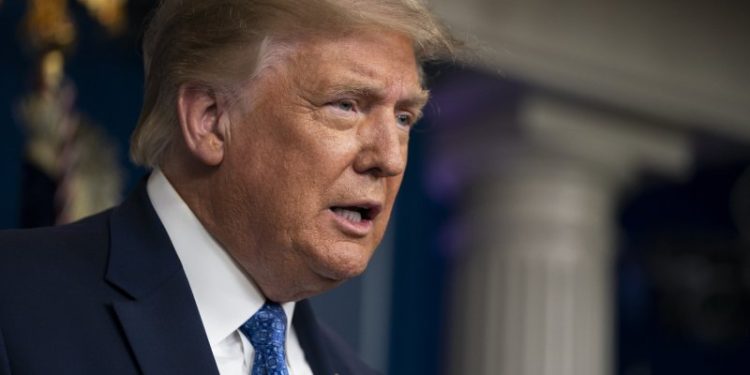Former President Donald Trump submitted a brief on Tuesday to reinforce his argument that ex-presidents should be shielded from criminal prosecution for activities purportedly involving official duties during their time in office.
The United States Court of Appeals for the District of Columbia Circuit ruled early in February that Trump faced a four-count indictment in Washington, D.C., stemming from his actions contesting election results and disrupting the constitutional protocol for presidential power transfer. The court affirmed the district court’s decision to reject Trump’s motion to dismiss the indictment, emphasizing that as a former president, he had transitioned into a private citizen subject to standard criminal defenses, devoid of any executive immunity.
Trump’s brief presented to the Supreme Court highlighted the absence of any former or sitting president facing criminal charges for official actions from 1789 to 2023. It argued that subjecting a president to potential criminal prosecution post-presidency would compromise the presidency’s integrity and independence, influencing decision-making during their term.
The brief contended that denying criminal immunity would render future presidents susceptible to coercion and political exploitation, thereby diminishing the presidency’s authority and effectiveness. It referenced the Supreme Court’s precedent in Marbury v. Madison, asserting that a president’s official acts should remain beyond judicial scrutiny. Additionally, it cited a 1982 ruling affirming that courts couldn’t hold a former president personally liable for actions within their official responsibilities.
Trump’s brief urged the Court to preserve the historical precedent of immunity from criminal prosecution for official acts, aligning with the nation’s foundational principles. It emphasized the need to safeguard the president’s distinct authority, which it deemed fundamental to the Republic’s stability and continuity.
The brief also highlighted instances where past presidents had been accused of committing “criminal” official acts according to their political adversaries:
For example, John Quincy Adams was accused of a “corrupt bargain” in appointing Henry Clay as Secretary of State after Clay delivered the 1824 election to him in the House. Andrew Jackson disregarded this Court’s rulings and forced the resettlement of many people, resulting in the infamous “Trail of Tears.” President Roosevelt imprisoned over 100,000 Japanese Americans during World War II. President Clinton repeatedly launched military strikes in the Middle East on the eve of critical developments in the Monica Lewinsky scandal, with the likely goal of deflecting media attention from his political travails. President Clinton also pardoned fugitive financier Marc Rich, resulting in widespread accusations of criminal corruption, including illegal quid pro quo. President George W. Bush was accused of knowingly providing false information to Congress about Saddam Hussein’s “weapons of mass destruction” in order to launch the Iraq War on false pretenses, leading to the deaths of over 4,400 Americans, with almost 32,000 wounded. President Obama targeted and killed U.S. citizens abroad by drone strike without due process. President Biden’s mismanagement of the southern border, dealings with Iran, and funding of pro-Hamas groups face similar accusations.
In all of these instances, the President’s political opponents routinely accuse him, and currently accuse President Biden, of “criminal” behavior in his official acts. In each such case, those opponents later came to power with ample incentive to charge him. But no former President was ever prosecuted for official acts—until 2023.
The Founders were keenly aware that politically motivated prosecutions pose a grave threat to republican government. … The Founders viewed protecting the independence of the Presidency as well worth the risk that some Presidents might evade punishment in marginal cases. They were unwilling to burn the Presidency itself to the ground to get at every single alleged malefactor.
The D.C. Circuit’s alternative holding is untenable and contradicts this Court’s well- established precedent. Perhaps its proponents find the theory attractive because they believe that making immunity turn on “the specific charges in the Indictment,” would effectively deny criminal immunity to President Trump only, while leaving all other Presidents immune. If so, that is not a strength but a fatal defect of the theory.
As DOJ has written, “the constitutional concern is not merely that any particular indictment and criminal prosecution of a sitting President would unduly impinge upon his ability to perform his public duties. A more general concern is that permitting such criminal process … would affect the underlying dynamics of our governmental system in profound and necessarily unpredictable ways, by shifting an awesome power to unelected persons lacking an explicit constitutional role vis-a-vis the President.”
Thus, the consequences of this Court’s holding on Presidential immunity are not confined to President Trump. They will affect the Presidency itself for the rest of our Nation’s history.
 Telegram is where we really talk. Don't miss out!
Telegram is where we really talk. Don't miss out!






